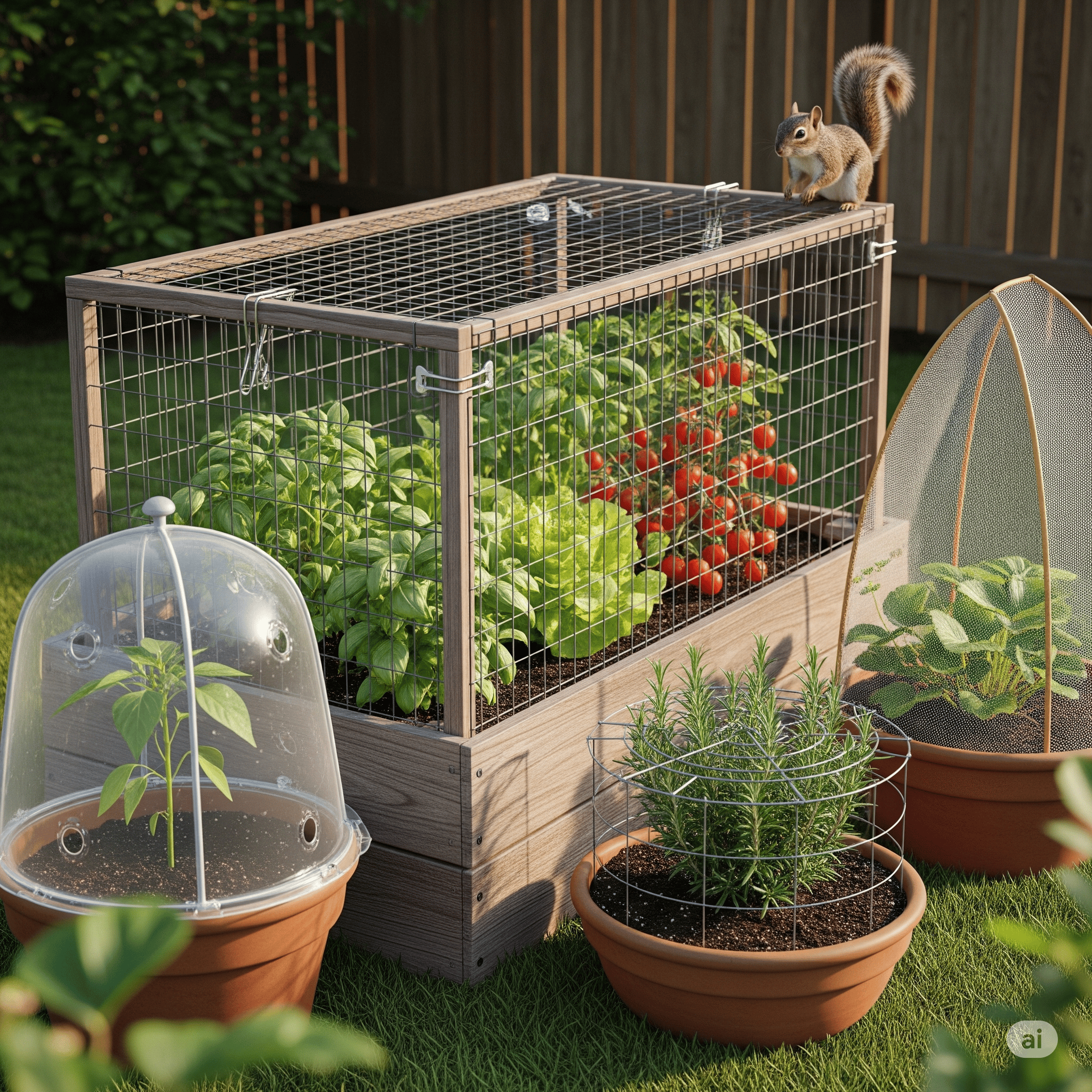How to Protect Raised Garden Beds and Pots from Squirrels
- August 06, 2025
- by
- John Miller
Why Raised Beds and Containers Are Easy Targets
Squirrels are clever and curious. Raised garden beds and pots often become their playgrounds. Why? Because these gardens are easy to reach. There’s soft soil for digging and tasty treats like seeds, bulbs, and vegetables.
Unlike ground-level gardens, raised beds don’t have much natural cover. That makes it easier for squirrels to hop in, dig around, and snack. The soil stays loose and fresh, which is perfect for planting—but sadly, also perfect for digging.
Also, container gardens usually sit on decks, patios, or balconies—close to trees, fences, or roofs. These give squirrels a free highway to your plants.
The Ultimate Solution: Building a Protective Cover or Cage
If you’re tired of chasing squirrels away every day, a physical barrier is your best bet. A cage or cover keeps squirrels out for good, without harming them. It’s simple, effective, and lasts for years.
Designing a Simple PVC or Wood Frame
Start with a basic box-shaped frame. You can use:
- PVC pipes (lightweight and cheap)
- Wood strips (strong and sturdy)
Measure your raised bed or container. Cut the pipes or wood to fit the size. Connect the corners with elbows (for PVC) or screws (for wood). Make sure the frame is tall enough for your plants to grow freely.
For pots, you can build smaller covers or even mini cages that sit directly on top.
How to Properly Secure Netting or Hardware Cloth to the Frame
Once your frame is ready, it’s time to cover it.
- Use hardware cloth if you want strong, long-lasting protection. It’s a metal mesh that squirrels can’t chew through.
- Use garden netting for lighter jobs, like protecting flowers or herbs.
Stretch the material tightly over the frame. Use zip ties, garden staples, or a staple gun to hold it in place. Be sure to leave a flap or hinged side, so you can open it easily for watering or harvesting.
Tip: Bury the edges of the net or cloth a few inches into the soil. This stops squirrels from sneaking in from the sides.
Simple, Low-Cost Ways to Stop Squirrels from Digging in Pots
If a full cover feels like too much work, don’t worry. There are other easy ways to keep squirrels away from potted plants.
Using a Top-Layer Barrier: Gravel, Mulch, or Mesh
Squirrels dig because the soil is soft. Add a tough layer on top, and they’ll lose interest fast.
Try this:
- Spread coarse mulch (like bark or pine cones).
- Place decorative gravel or river stones.
- Lay chicken wire or mesh just under the surface.
This confuses squirrels and makes it hard for them to dig. It also keeps moisture in the soil—a bonus for your plants.
DIY Plant Cages for Individual Containers
You don’t need to cage your whole patio. Use mini plant cages instead. Here’s how:
- Take wire baskets or old kitchen strainers.
- Cut out the bottoms (if needed).
- Flip them upside down and place them over small plants.
For larger containers, build a circle of wire mesh and fasten it with twist ties. These quick cages are cheap and squirrel-proof.
Strategic Placement of Pinwheels and Other Small Deterrents
Squirrels hate movement and noise. Try adding some small, fun touches:
- Colorful pinwheels
- Hanging CDs or mirrors
- Garden spinners
- Wind chimes
Place them near your pots or beds. The flashing light and sound confuse squirrels, making them stay away.
Note: These work best as extra protection—not the only one.
Protecting Recently Planted Seeds and Bulbs in Raised Beds
Freshly planted beds are a squirrel’s dream. The loose soil, the smell of seeds—it’s an open invitation. Protecting this stage is very important.
Here’s how:
- Cover the area with hardware cloth or screening until sprouts appear.
- Place plastic forks upside down (handles buried) to poke the squirrels.
- Sprinkle blood meal or cayenne pepper as a natural repellent.
Once your plants start to grow, squirrels usually lose interest.
Also, avoid planting nuts or fruit in open areas, as this attracts them quickly.
Can Repellents Be Effective in a Contained Space?
Yes, repellents can help—especially in small gardens and patios. But you must use them the right way.
There are two main types:
1. Natural Smell-Based Repellents
Squirrels dislike strong smells. These work well:
- Peppermint oil: Mix with water and spray around pots.
- Vinegar and garlic spray: Strong and safe for plants.
- Cayenne pepper: Sprinkle on the soil or mix in water and spray.
Reapply after rain or watering. These don’t harm squirrels—they just tell them to stay away.
2. Commercial Repellent Sprays
Some sprays use urine from predator animals. These can scare squirrels but may also smell bad to humans.
Use them carefully, especially near herbs or food crops.
Tip: Combine repellents with other methods, like cages or mesh. This gives double protection.
Conclusion: Choosing the Right Protection for Your Setup
Every garden is different. Some people grow herbs in small pots on balconies. Others have big raised beds filled with veggies. So, choose what works best for you:
- For full protection: Build a cage or cover using PVC and hardware cloth.
- For smaller setups: Use top-layer barriers like gravel or mesh.
- For quick fixes: Add pinwheels or spray natural repellents.
Remember: You don’t need fancy tools. With a bit of creativity and basic materials, you can keep squirrels away for good.
They may be cute, but they don’t belong in your lettuce patch!
For more natural solutions, check out our DIY Repellents Guide.
✅ Quick Summary Tips:
- Use cages for full protection.
- Add gravel or mesh to stop digging.
- Spray peppermint oil to repel them.
- Add spinners or wind chimes for movement.
- Cover fresh soil until plants grow.
Frequently Asked Questions
Squirrels dislike strong smells like peppermint oil, vinegar, garlic, and cayenne pepper. Spraying these around garden beds or pots can help keep them away naturally.
No, cayenne pepper is safe for most plants and soil. It only affects squirrels’ noses and taste. Just don’t overuse it, and avoid direct contact with young leaves.
Place a layer of gravel, mulch, or chicken wire on top of the soil. You can also use small wire covers or mini cages to stop squirrels from reaching the dirt.
Yes, they work well in open areas like raised beds. A sudden burst of water scares squirrels away without hurting them. It’s a great hands-free option.
In many places, trapping or moving squirrels is illegal or discouraged. The best way is to block access using safe and humane methods like cages, netting, or repellents.



